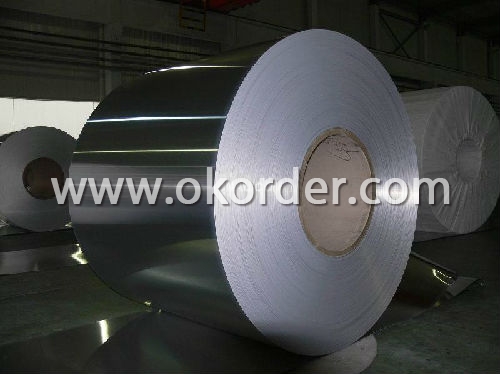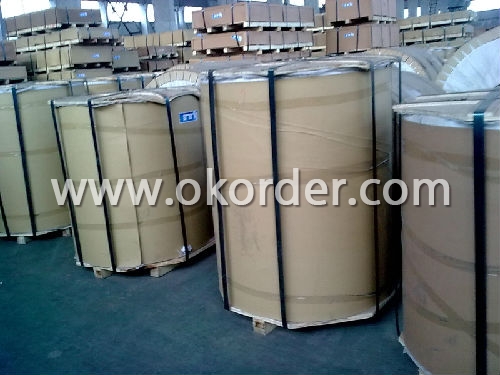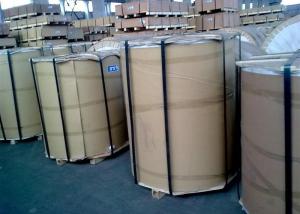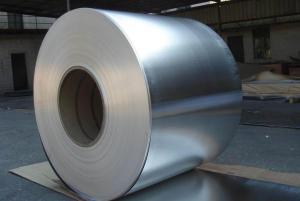Aluminium Coil Made in China High Quality
- Loading Port:
- China main port
- Payment Terms:
- TT or L/C
- Min Order Qty:
- 3 m.t.
- Supply Capability:
- 10000 m.t./month
OKorder Service Pledge
OKorder Financial Service
You Might Also Like
1. Specifications of Aluminum Coil
| Alloy Number | AA1xxx (AA1050, AA1060, AA1070, AA1100 etc.) AA3xxx (AA3003, AA3004, AA3005, AA3105 etc.) AA5xxx (AA5052, AA5083, AA5754 etc.) AA8xxx (AA8011, AA8006 etc.) |
| Temper | H14, H16, H18, H22, H24, H26, H32, O/F |
| Thickness | 0.2mm - 100mm |
| Width | 10mm- 2200mm |
| Standard | Standard: GB/T 3880-2006 |
Special Specification is available on customer’s requirements

2. Usage/Applications of Aluminum Coils AA3003
Aluminum Coils has a wide variety of uses in the construction industry including aluminium siding and roofing. Sheet is also used widely in construction, decoration, transport applications and other various industrial filed, such as automobile body panels, airframes, curtain walls and the hulls of boats etc.
3. Packaging & Delivery of Aluminum Coils AA3003
Packaging: Seaworth package, water-proof paper wrapped inside, carton wrapped outside in wooden pallets.
- Q:How are aluminum coils transported and delivered?
- Aluminum coils have various transportation options, including road, rail, and sea. The choice of transportation depends on factors like distance, quantity, and urgency. For short distances, road transportation is common. Special trucks with flatbed trailers or coil carriers are used to securely transport the coils. These trucks have features like adjustable cradles or coil pads to prevent shifting during transit. Longer distances often involve rail transportation. Railcars can accommodate many coils depending on their size and weight. Rail transport is cost-effective and environmentally friendly for long-haul journeys. When coils need to be transported overseas or to another continent, sea transportation is preferred. Shipping containers protect the coils from potential damage. Cargo ships have the capacity and stability for long-distance transportation. Regardless of the mode of transportation, it is vital to handle aluminum coils carefully to prevent damage. Coils are protected from excessive vibration, impact, and adverse weather conditions. Tracking systems are used to monitor the location and condition of the coils during transportation. Overall, the transportation and delivery of aluminum coils require a well-coordinated logistics network to ensure timely and efficient delivery while minimizing the risk of damage.
- Q:Are there any environmental benefits to using aluminum coils?
- Yes, there are several environmental benefits to using aluminum coils. Firstly, aluminum is a highly recyclable material, meaning that it can be reused multiple times without losing its quality. This reduces the need for extracting and processing new raw materials, saving energy and reducing carbon emissions. Additionally, aluminum coils are more lightweight compared to other materials, reducing transportation fuel consumption and associated greenhouse gas emissions. Moreover, aluminum has a longer lifespan, making it more durable and reducing waste generation. Overall, using aluminum coils contributes to a more sustainable and eco-friendly approach in various industries.
- Q:Can aluminum coils be used in packaging industries?
- Yes, aluminum coils can be used in the packaging industry. Aluminum is a popular choice for packaging materials due to its numerous advantageous properties. It is lightweight, durable, corrosion-resistant, and has excellent thermal conductivity. These qualities make aluminum coils suitable for various packaging applications, such as food and beverage packaging, pharmaceutical packaging, and cosmetic packaging. Additionally, aluminum is highly recyclable, making it an environmentally friendly choice for the packaging industry. Overall, aluminum coils offer excellent performance and versatility, making them a suitable option for packaging industries.
- Q:How are aluminum coils measured and specified?
- Several key factors are taken into account when measuring and specifying aluminum coils. Gauge or millimeters are typically used to measure the thickness of the coil, which determines its strength and durability. Thicker coils are more robust. The width of the coil, measured in inches or millimeters, is another important specification. It determines the size and coverage area of the coil, with wider coils offering greater coverage. The length of the coil is also crucial and is typically measured in feet or meters. It determines the amount of material available for a specific project. Longer coils are often preferred as they minimize the need for joints during installation. The aluminum alloy and temper used in the coil are specified as well. Different alloys have different mechanical and chemical properties, making them suitable for specific applications. The temper, which refers to the heat treatment process applied to the aluminum, affects its hardness and flexibility. The weight of the coil is an important consideration and is typically measured in pounds or kilograms. It determines the handling and transportation requirements for the coil. Lastly, the surface finish of the coil is specified. Common finishes include mill finish, which is untreated, and coated finishes such as painted or anodized. The surface finish affects the appearance and corrosion resistance of the coil. Overall, the measurement and specification of aluminum coils involve factors like thickness, width, length, alloy, temper, weight, and surface finish. These specifications ensure that the coils meet the desired requirements for various applications.
- Q:How long do aluminum coils last?
- The lifespan of aluminum coils can vary depending on various factors such as usage, maintenance, and environmental conditions. However, on average, well-maintained aluminum coils can last anywhere between 15 to 20 years.
- Q:How do aluminum coils contribute to sustainable packaging?
- Sustainable packaging practices are greatly influenced by aluminum coils. Firstly, aluminum possesses the unique quality of being infinitely recyclable, meaning it can undergo recycling processes repeatedly without compromising its properties or quality. This aspect significantly enhances the sustainability of packaging as it reduces the necessity of extracting and processing new materials, thereby conserving natural resources and minimizing the environmental impact associated with mining and production. Furthermore, aluminum coils boast exceptional barrier properties, effectively safeguarding packaged goods from external elements including moisture, light, and oxygen. This barrier function plays a crucial role in prolonging the shelf life of products, thereby reducing food waste and eliminating the need for additional packaging or preservatives. By maintaining the freshness of products for extended periods, aluminum coils contribute to sustainable packaging efforts by combating food loss and promoting resource efficiency. Moreover, aluminum's lightweight nature makes it an ideal material for packaging. Its low weight allows for reduced transportation costs and energy consumption during shipping, ultimately leading to a decrease in overall carbon emissions. Additionally, the lightweight characteristic of aluminum coils makes them convenient for end consumers, thereby minimizing the environmental impact associated with disposal and recycling. Additionally, aluminum demonstrates high durability and resistance to corrosion, ensuring the integrity of packaging throughout its lifecycle. This durability allows for the reuse or repurposing of aluminum coils, further reducing waste and extending the material's lifespan. In conclusion, the utilization of aluminum coils in packaging promotes sustainability in various ways. It contributes to a circular economy by being infinitely recyclable, reduces food waste through effective barrier properties, lowers carbon emissions through lightweight design, and encourages reuse and repurposing due to its durability. By incorporating aluminum coils into packaging solutions, significant strides can be made towards achieving a more sustainable and environmentally friendly packaging industry.
- Q:Can aluminum coils be used in the production of aluminum louvers?
- Yes, aluminum coils can be used in the production of aluminum louvers. Aluminum coils are typically used as a raw material in various manufacturing processes, including the production of aluminum louvers. They can be easily formed and shaped into the desired louver design, offering durability and corrosion resistance.
- Q:How do aluminum coils contribute to sustainability efforts?
- Aluminum coils play a significant role in sustainability efforts due to their numerous environmental benefits. Firstly, aluminum is a highly recyclable material, with almost 75% of all aluminum ever produced still in use today. This means that aluminum coils can be recycled and reused indefinitely without losing their original properties, resulting in significant energy savings and reduced greenhouse gas emissions compared to producing new aluminum. Furthermore, the recycling process of aluminum coils requires only 5% of the energy needed to produce new aluminum from raw materials. This energy efficiency not only saves valuable resources but also reduces the extraction and processing of bauxite ore, the primary source of aluminum, which can have detrimental effects on the environment. Additionally, aluminum coils are lightweight yet durable, making them an ideal choice for various applications in industries such as automotive, construction, and packaging. Their lightness reduces fuel consumption in transportation, leading to lower carbon emissions. Moreover, their durability ensures a longer lifespan, reducing the need for frequent replacements and thus minimizing waste generation. The use of aluminum coils also contributes to sustainable building practices. Aluminum is corrosion-resistant, making it suitable for exterior applications and reducing maintenance requirements. Moreover, it can be easily integrated into energy-efficient building systems, such as reflective roofing, which helps to reduce energy consumption and mitigate the urban heat island effect. In summary, aluminum coils contribute to sustainability efforts by being highly recyclable, energy-efficient in production and recycling, lightweight to reduce fuel consumption, durable to minimize waste, and suitable for various sustainable applications. By choosing aluminum coils, industries and individuals can actively participate in promoting a circular economy and reducing their environmental footprint.
- Q:What is the cost-effectiveness of using aluminum coils in the long run?
- The cost-effectiveness of using aluminum coils in the long run can be quite significant. While the initial cost of aluminum coils may be higher compared to other materials like copper, their long-term benefits make them a cost-effective choice. Firstly, aluminum coils have excellent corrosion resistance, which means they are less likely to deteriorate over time. This translates into longer lifespan and reduced maintenance costs. Aluminum coils also have high heat transfer efficiency, which allows for improved energy efficiency and lower energy consumption. Furthermore, aluminum is a lightweight material, making it easier and cheaper to transport and install compared to heavier alternatives. This can result in reduced labor costs during installation or replacement. Another factor contributing to the cost-effectiveness of aluminum coils is their recyclability. Aluminum is highly recyclable, and the scrap value of aluminum coils can help offset the initial investment. Additionally, using recyclable materials aligns with sustainability goals and can contribute to a positive brand image and reputation. Overall, while the upfront cost of aluminum coils may be higher, their long-term benefits including corrosion resistance, energy efficiency, recyclability, and reduced maintenance and labor costs make them a cost-effective choice in the long run.
- Q:How are aluminum coils protected against scratches and damage?
- Aluminum coils can be safeguarded from scratches and damage through various methods. One effective approach involves applying a protective coating or film to the surface of the coil, serving as a barrier against potential sources of damage like abrasion or impact. Another means of protection is through the utilization of coil coating. This involves cleaning, pre-treating, and coating the coil with a layer of protective paint or resin. This not only enhances the coil's appearance but also provides a safeguard against scratches and other types of damage. Moreover, during the manufacturing and handling process, aluminum coils are frequently wrapped or packaged using materials that offer cushioning and protection. This prevents scratches or dents that may occur during transportation or storage. Lastly, proper handling and storage practices are crucial in preserving the integrity of aluminum coils. Exercising care when handling the coils, employing suitable equipment and techniques, can effectively minimize the risk of scratching or causing other damage. Storing the coils in a clean and dry environment further aids in preventing potential harm. In conclusion, the combination of protective coatings, coil coating processes, proper handling, and storage practices ensures that aluminum coils remain well-protected from scratches and damage, thus maintaining their quality and appearance.
1. Manufacturer Overview |
|
|---|---|
| Location | Henan, China |
| Year Established | 1996 |
| Annual Output Value | Above US$200 Million |
| Main Markets | Mid East;Eastern Europe;North America |
| Company Certifications | ISO 9001:2000;ISO 14001:2004;OHSAS 18001 |
2. Manufacturer Certificates |
|
|---|---|
| a) Certification Name | |
| Range | |
| Reference | |
| Validity Period | |
3. Manufacturer Capability |
|
|---|---|
| a)Trade Capacity | |
| Nearest Port | Shanghai |
| Export Percentage | 30%-50% |
| No.of Employees in Trade Department | 21-50 People |
| Language Spoken: | English;Chinese |
| b)Factory Information | |
| Factory Size: | Above 100,000 square meters |
| No. of Production Lines | Above 10 |
| Contract Manufacturing | OEM Service Offered;Design Service Offered |
| Product Price Range | Average |
Send your message to us
Aluminium Coil Made in China High Quality
- Loading Port:
- China main port
- Payment Terms:
- TT or L/C
- Min Order Qty:
- 3 m.t.
- Supply Capability:
- 10000 m.t./month
OKorder Service Pledge
OKorder Financial Service
Similar products
New products
Hot products
Related keywords






























